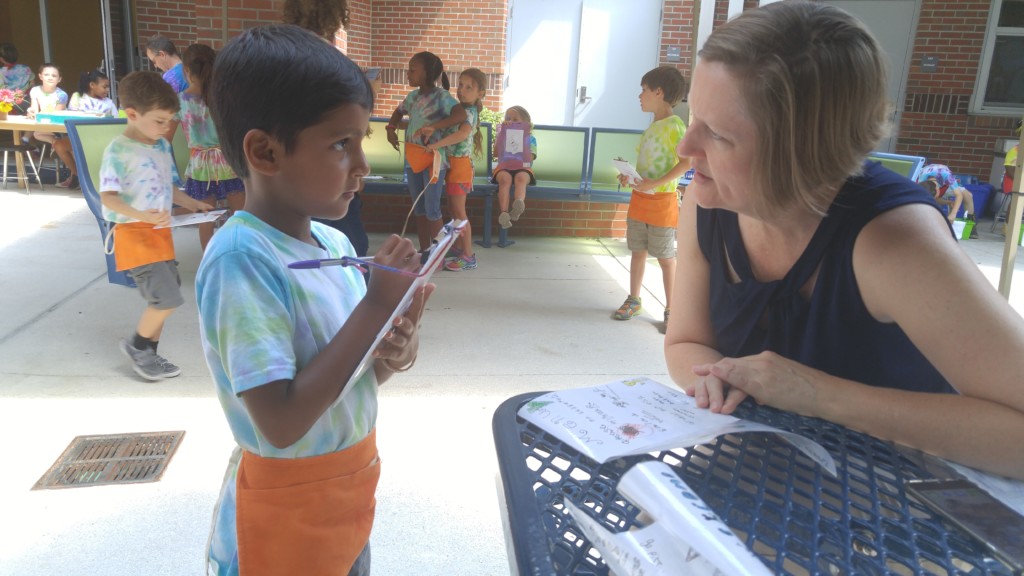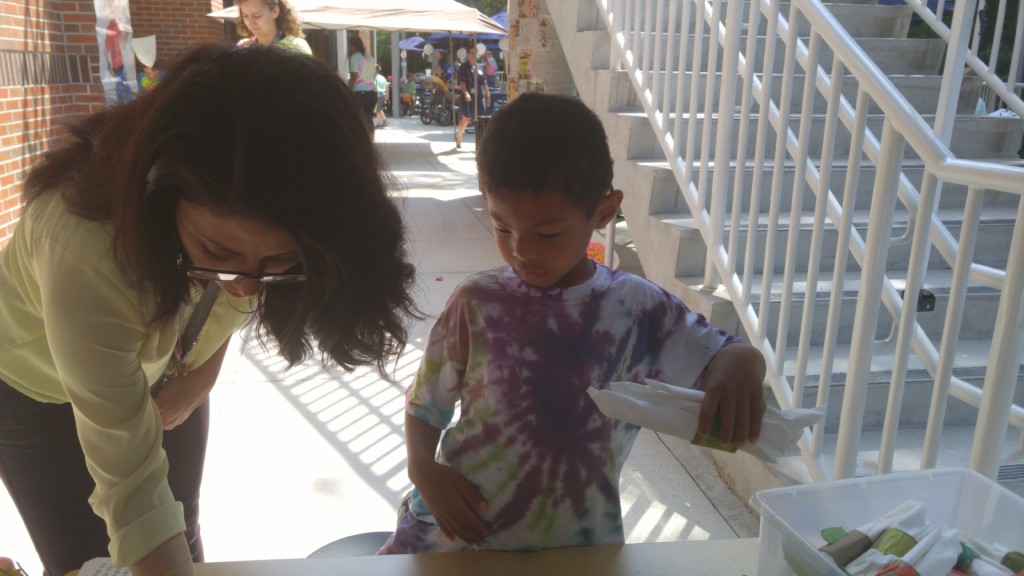
Vade Kafie, a student at P.K. Yonge, takes Julie Henderson's order at Pizza by the Creek, a six-week project based on personalized learning
GAINESVILLE, Fla. - Italian music played in the background as kindergarten and first-grade students welcomed parents and guests to Pizza by the Creek — a student-managed restaurant at P.K. Yonge Developmental Research School.
Several donned waiter outfits, preparing to serve pizza to parents and guests. Others carried boxes with materials to clean tables. One student served as a hostess, holding napkins neatly folded with plastic silverware. A few other students managed the cash register, giving actual change back to customers as they left.
Instead of assigning students specific tasks in the restaurant, their teachers hosted a job fair. Students applied for their positions with the restaurant, part of a six-week project-based learning unit that incorporates principles of personalized learning.
The definition of personalized learning is hotly contested and constantly changing. It generally refers to the idea that education should be tailored to every student’s needs, interests and strengths.
Students can participate in fun activities such as Pizza by the Creek, while at the same time, teachers can ensure those activities help them reach specific learning goals, like the Florida State Standards.
One aspect of personalization is competency-based learning, which allows students to advance to a higher level of learning regardless of the time they spend on a subject once they show mastery. Educators at P.K. Yonge said Pizza by the Creek is just one example of how they’re honing techniques that can help raise student achievement and better prepare students for the real world.
The school's mission requires educators to experiment with cutting-edge techniques, while also making sure they serve their students well.
“We see a much bigger picture of what is personalized learning and how you can design an environment to support that,” said Lynda Hayes, director of P.K. Yonge. “We are working in a high-stakes environment, demanding a lot of change and at the same time trying to mitigate any risk, and it is quite a juggling act.”
The K-12 school is high achieving, having received an ‘A’ in 2016.
The Florida Department of Education reported 68 percent of students at least passed or received a higher mark on the English Language Arts and math exams. The same nearly held true for the school's science scores, with 65 percent of students achieving such results.
Although P.K. Yonge is not a charter school, it admits students by a lottery. As a lab school, it’s required to enroll a student population that roughly reflects the statewide student population.
According to the school, 50 percent of its students are below Florida’s median income; 52 percent are children of color and 12 percent include students with disabilities. Students commute from more than 30 surrounding small and rural North Florida cities and towns.

Becca Antelis, an elementary school counselor at P.K. Yonge helps Alexander Miles prepare to place customers at their table at Pizza by the Creek.
P.K. Yonge educators say while elements of personalized learning have been around for decades, newer developments – like technology, curriculum, software and tests that help monitor student progress in real time, as well as the state education standards, have enabled educators to give students more choice, flexibility and independence.
“There is a real emphasis on understanding students as learners and little humans and as members of the community,” said Julie Henderson, communications director for P.K. Yonge. "With new tools available to us we become more able to personalize the learning process for students."
Henderson added some of the newer developments are not necessarily “just discovered” but are newly applied in the school’s context.
For example, tests are no longer something students take at the end of the year, she said. On the contrary, they are tools that help students evaluate their own strengths and weaknesses, guiding them on what to do next.
“An assessment is then part of the learning process, not the end of the learning process,” Henderson said.
Christy Gabbard, program development and outreach specialist at P.K. Yonge, said the school has a focus on student-centered learning and being responsive to students' needs. It wants students to lead their own learning process.
“Pizza by the Creek helps them know themselves a little better as learners and workers," Gabbard said.
Choice in learning
Pizza by the Creek is the culminating event of a six-week social studies unit.
Activities on display in the restaurant address specific standards students are expected to master: recognizing that money is a method of exchanging goods and services; defining opportunity costs as giving up one thing for another; distinguishing between examples of goods and services; distinguishing people as buyers, sellers, and producers of goods and services; and recognizing the importance of saving money for future purchases.
Personalization pervades the school culture at P.K. Yonge.
Kindergarten students can make their own choices about what activity they participate in during workshop time. High school students make choices about how they will answer questions on English Language Arts exams. Classrooms are situated in an open building, where there is room for collaboration between teachers and students.
During literacy workshops, students can choose from different reading and writing activities. In independent reading workshops, they choose from different books appropriate for their reading level. And they can choose how to respond to the books they read in their assigned response journals. They could choose to write, draw a picture, create a diagram, or do an activity with a partner.
Changing the dynamics of the classroom
Students have had some of those choices for a long time. But Hayes said educators need to prepare for more far-reaching changes.
She said a false, unspoken premise has driven the school system for years: that every student is at the same learning level and will finish at the same pace.
“For us, we have been deeply in the throes of challenging the old assumptions, and we are seeing success,” Hayes said.
Right now, Florida law requires students to receive instruction for a set number of minutes to get credit.
Hayes said schools need more flexibility under those requirements to maximize personalized learning.
“We can no longer afford to have a school system that is designed to filter kids out and sink some to the top and others to the bottom,” said Hayes. “If we are going to push on these schools to achieve more equity and outcome for all students we have to be released from the lockstep model around time and around credits.”
A growing chorus of education advocates is sounding similar themes.
A state law passed in 2016 gave P.K. Yonge, as well as four school districts, the opportunity to participate in a pilot program to experiment with competency-based learning. Schools can apply for waivers of state laws that might stand in the way of increased learning personalization.
Gabbard, the school’s program development and outreach specialist, said experiments with personalized learning are already paying off.
“Students are able to work in ways that make the most sense for them. It is not one-size-fits-all,” she said “That is the big shift.”
“It is very focused on building that self-regulation and students understanding where (their) strengths are and points of weakness,” she added.
That way, they can build coping mechanisms for those weaknesses, and overcome them.
Correction: An earlier version of this post misspelled the name of Becca Antelis. We regret the error.